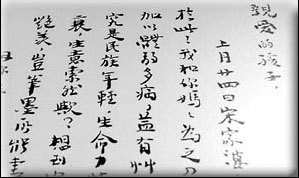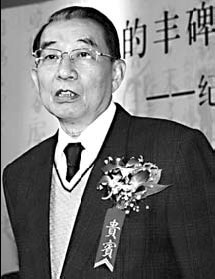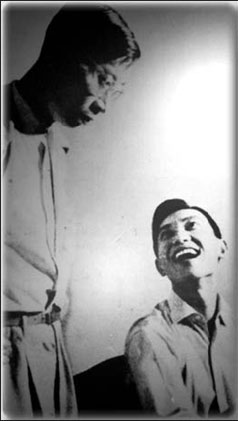Beacon of light for many
Most friends remember Fou Lei as a tall, lanky and serious man. Raised by a strict mother after his father died when he was just 4, the scholar rarely smiled and led a life defined by discipline. He always placed his ashtray and a French-Chinese dictionary on the right side of his desk, with an inkslab and the books he was translating on the left.
|
Fou Lei wrote many long letters to his sons on life and art. File photo |
In the center, came a pile of paper with vertical lines carrying the name of his study, "Strong Wind and Swift Rain" (Jifeng Xunyu Lou). In fact, his name "Lei" means "thunder".
Atop his bulky book shelf stood a picture of his wife Zhu Meifu, whom he called "Margaret", after the character in Faust by Johann Wolfgang von Goethe (1749-1832).
"How many men were lucky to marry their Margaret? Meifu was not only a gentle wife, loving mother, charming Madame in the salon... she was also Fou Lei's secretary, keeping notes on cards, copying manuscripts, dealing with uninvited guests," says renowned translator Yang Jiang in a 1980 article. In the 1930s, Yang and her husband Qian Zhongshu shared rare moments of joy with the Fou family in Shanghai, at the time of the Japanese occupation.
Ye Yonglie, who spent years writing about the Fou family and others caught in the "cultural revolution", sums up Fou's achievements in his Pictured Biography of Fou Lei as: the translation of French literary classics; the education of Fou Ts'ong, a world famous pianist; and Fou Lei's Family Letters compiled by his younger son Fou Min.
Fou Lei was determined to develop Fou Ts'ong's talent in music. Besides finding a piano and music tutors, Fou pulled his elder son out of primary school and compiled textbooks on the ancient classics for him.
But the boy was like "a clock that had to be rewound" constantly by his father. Fou Ts'ong told Chinese media that he often let his hands play on the keyboard, while focusing on Li Kui, the Black Whirlwind, in the novel Outlaws of the Marsh.
His father would spin down the stairs from his study and roar at him, "just like Li Kui", Fou Ts'ong says.
Eventually, the love of music made the rebellious teenager follow his heart. "When I was very young, I enjoyed playing the piano so much that I felt like I was in paradise This had nothing to do with technique or cultivation. You can say it was a gift from heaven," Fou Ts'ong recalls.
A rare photo of 1953 shows Fou Lei smiling. That August, Fou Ts'ong had won an award at an international festival held in Budapest. Two years later, he won important awards at the Fifth Frederic Chopin International Piano Competition held in Warsaw. He had become a hero for a nation trapped in international hostility.
|
An emotional Fou Min recalls his father's life at an exhibition held to mark Fou Lei's 100th birthday. Liu Jun |
But the happy days did not last. In 1958, Fou Lei became one of 550,000 "Rightists" because of his outspoken articles and speech.
Fou Ts'ong was studying music in Warsaw and didn't know what would happen. The 24-year-old made an astounding decision - to leave Warsaw for London. For years, he was officially seen as a "traitor".
Fou Ts'ong later told Chinese media that neither he nor his father would "expose" each other. "If I didn't leave, I wouldn't be here today. Maybe in the 'Anti-Rightists Movement' of 1958, all of us would have perished."
With Premier Zhou Enlai's help, Fou Lei resumed correspondence with his son in 1959. He talked little about his own troubles, but expressed concern that agents were making his son to perform every three or four days.
"Each time you ascend the stage, the country's reputation is at stake. A person's honors and humiliations are nothing; those of the country are grave! You love our country, don't ever forget this.
"For your body, for your spirit, for art, and for the country's honor, you have to reduce your performances. I have not been able to sleep well since reading your letter. I often wake up startled several times at night!"
In 1965, when Fou Ts'ong went to Hong Kong for a concert, he called home for the first time in seven years. In a letter dated May 18, Fou tells his parents: "The material civilization of the West is surprising and the upper classes talk about culture. But I'd rather listen to the hubbub of noises and watch people's smiling faces on an Eastern street, as a familiar empathy melts my heart."
The parents probed the meaning of life, music and art with their sons in letters that often spanned many pages. In 1981, Fou Min sorted out the letters treasured by his brother and published Fou Lei's Family Letters that has been reprinted seven times and has sold more than two million copies.
Sadly, the correspondence was cut short by the gathering political storm. In August 1966, "Red Guards" ravaged the scholar's home. Over four days and three nights, they searched every corner for "anti-revolutionary" evidence.
They found pictures of Chiang Kai-shek and his wife from an old trunk. But Fou wouldn't say who left it with them, just as he wouldn't use an alias to get his works published. The couple were dragged to the door, pushed onto a bench and crowned with tall paper hats in front of the raging mob.
On the morning of Sept 3, their maid Zhou Judi discovered the couple's bodies. In horror, she thought they had poisoned themselves. Years later, Ye Yonglie talked with local police and found out that the couple had hanged themselves. Fou was 58, Zhu was 53.
On April 26, 1979, the Shanghai Federation of Literary and Art Circles and the Shanghai Writers' Association held a memorial meeting for Fou Lei and his wife, to retract the accusations against the scholar.
It was a miracle that Fou Ts'ong attended the meeting and the couple's cinerary caskets were found in a rural cemetery, thanks to the efforts of a complete stranger named Jiang Xiaoyan.
Fou Ts'ong heard about his parents' death two months later in 1966. He said he had been expecting the terrible news, knowing his father only too well.
When US President Richard Nixon visited China in 1972, he saw a ray of hope to return home. But it wasn't until 1979 that the dream was finally realized, thanks to the efforts of many people, including former Chinese leader Deng Xiaoping.
|
A strict father, Fou Lei (left) is seen here with his son Fou Ts'ong, who went on to become a world-famous pianist. File photo |
The pianist, now 74, is hailed as the best interpreter of Chopin's works in the world. He will give a series of solo concerts dedicated to his father in April and May across the country, including a performance at the National Center for the Performing Arts on April 26 and 27.
Fou Min had wept when his father told him it was too late to learn the violin and that he would make a good teacher. In 1979, when he finally visited his brother in London, and most people thought he wouldn't return to China because of what he had suffered, he was actually eager to get back to his students.
"I'm trying to find some textbooks, especially those of mathematics and English," he says in a letter to a friend who was deeply moved and sent it to the People's Daily.
"The motherland is like our mother, can we leave our mother plagued by illnesses? Maybe my father's patriotism and nationalism has had a deep influence on me I am optimistic of our country's future, even though I know how circuitous the path can be."
Fou Lei often talked about chi zi zhi xin - the heart of a newborn, a phrase that describes a man "who is pure, flawless, transparent and thinks nothing about himself but works throughout his life for the motherland, art, ideals and other people", says Fou Min, 71.
The retired English Teacher from Beijing No. 7 Middle School has dedicated himself to gathering and compiling Fou Lei's manuscripts and letters, an effort that he believes is essential for carrying on the rich heritage left by his father.
"We should learn from these lessons, so such tragedies are not repeated in our country, so we can nurture real people, people who have the heart of a newborn," he says.
(China Daily 04/15/2008 page20)

















